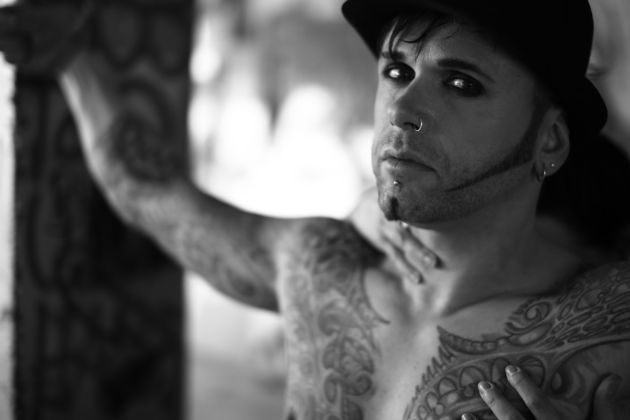 For the first time in years I was really nervous before an interview. The reason was probably that the music of OOMPH! accompanied me in my life for a very long time. Because of that it is very important for me that Dero supports and takes part in our project. And in fact it was not only a conversation about tattoos but also about pain, death, art and life. And that is exactly what I'm looking forward to sharing with you today.
For the first time in years I was really nervous before an interview. The reason was probably that the music of OOMPH! accompanied me in my life for a very long time. Because of that it is very important for me that Dero supports and takes part in our project. And in fact it was not only a conversation about tattoos but also about pain, death, art and life. And that is exactly what I'm looking forward to sharing with you today.Reflections of Darkness [RoD]: I have photographed you several times and actually until this year during the performances I have never really noticed that you are tattooed. On the stage, you are always completely clothed. The first exception was this year, when I saw a picture of your Moscow show - you wore a vest and it was possible to see your arms. Was that intentionally?
Dero: That was intentionally, yes. I like changes and this time outfits were planned where also more skin was to be seen. At previous concerts it was not so offered or not so yielded and this time it was just so. But I've been tattooed for a long time and I've talked about this in some interviews and in a few videos you can see it as well. I remember ‘Sex hat keine Macht’ and ‘Beim ersten Mal tuts immer weh’ where my tattoos are already visible.
RoD: You can see it already in the video to ‘Supernova’, but that time you had only the upper arm tattooed.
Dero: I agree. In that time, it began to grow bigger. And yes, meanwhile I've completed the whole relatively, up to small places, then I'm done.
RoD: When did you get your first tattoo and what was it? Did it take much time until you decided to get it done?
Dero: That was 1991 and I've been thinking about it a bit longer. At that time I was a big fan of black tattoos and that was a purely black work, but now it was covered with new bigger work.
RoD: Difficult question - how many tattoos do you have in total, or is it a one big project?
Dero: This is the integral work of art, exactly, so you cannot list them at all. From the outset, the intention was to give an overall picture. I was very much inspired by the fractal and biomechanical tattoos of Aaron Cain and Guy Aitchison.
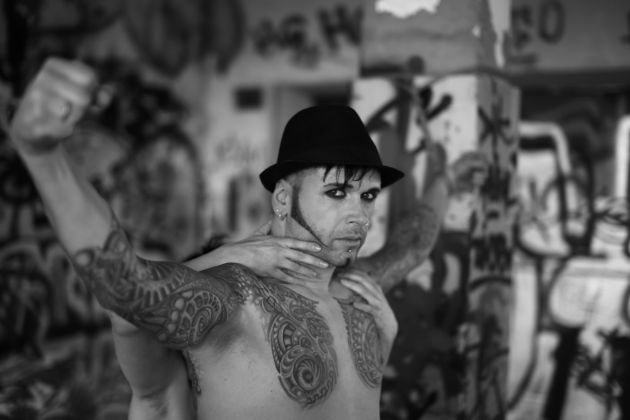
RoD: So, you have already answered the next question partly, that you have not yet done everything, that there are still small places to be covered. Did you get this whole work of art done by one tattoo artist?
Dero: Yes, in Wolfsburg at "Culture Shocks". Olli, their boss, did everything.
RoD: How did you choose him and who made the sketches?
Dero: I chose him because of his work. I looked around for many tattoo artists, looked at their portfolio and folders, looked at the works, the pictures that hang in their tattoo shops and which they had done. The motive itself was selected together, however, it was made freehand and then refined with the needle so that motive does not exist anywhere, in any book or somewhere else.
RoD: I think it has to be that way. I do not like people to have a copy of something.
Dero: Yes, that's true.
RoD: Getting tattooed hurts, how do you cope with the pain during the sessions? You have tattoos in places such as the chest, for example, which are very sensitive, that must be very painful.
Dero: Yes, it hurts a lot, that's right, but the pain is the part of the tattoo. Only then you understand what really happened. I think this is also the reason why some people made tattoos: overcoming of yourself and also pain experience. This is an aspect of tattoo which is important and not to be underestimated. In all cultures, pain plays a certain role, in all religions too. That's why I think that to get a tattoo has a similar effect on the body, a purifying, cataract effect, and after that you are somehow refined, liberated. The pain is, so to speak, very much linked to the tattoos and those who cannot stand it or one who notices feeling the pain is not the right thing for him, should not be tattooed. Because, as you say, there are places that are very, very sensitive and you cannot get around this pain. You cannot take any painkillers - every tattoo artist tells you - that is just not good. Accordingly, there are only a few cutaneous pain relievers that rub against the skin, but they do not help much, maybe a bit psychosomatic only.
We have lost a great deal of pain and death through our cultural changes. Earlier, when people had run archaically through the woods to kill their daily piece of meat, they were always confronted with the death. There could be a bear, a tiger, or poisonous snakes on every corner, there was always the danger of death there. This has almost been lost, has become very abstract. Now, the most likely danger of death in road traffic is likely to be statistically significant. But everyone also thinks they are in a safe car, with seatbelt and airbags and nothing bad can happen to them. That means, the death experience, the death fear, has become very abstract. This is perhaps also the reason why there are so many Horror movies or extreme sports, Wing suits, Bungee Jumping, Rafting and so on and so on. And tattooing is something that is as old as humanity. The Frozen Fritz, who was found in the Alps, was already tattooed. The primitive men have already been tattooed. This certainly had something to do with rituals and maybe also with tribal affiliation, but also with this painful experience, I think. It was important for people to overcome themselves and generate strength and power for themselves.
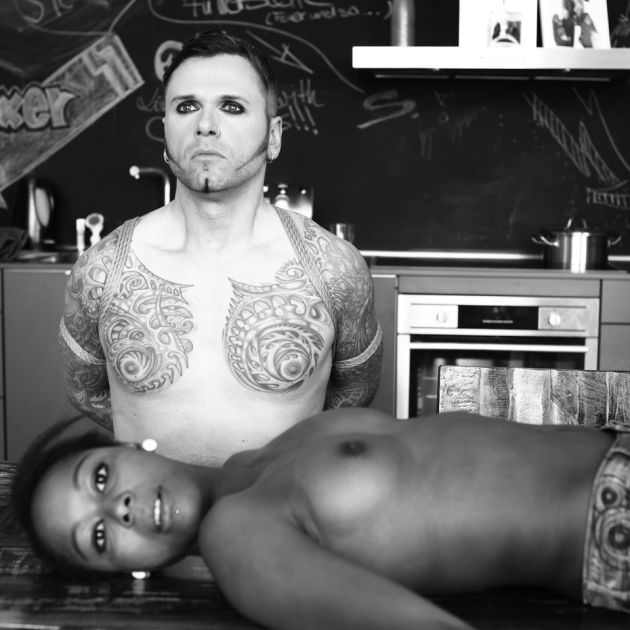
RoD: Yes, I find this totally sad… a lot of bad things are happening in our world now, but people somehow accept it, per the motto: "It's far away, nothing happens to me." They think the worst thing that could happen to them is a car accident or something like that.
Dero: I do not think that it’s good for society in general when the death is ignored. Old or dying people are deported to retirement homes or hospitals so that death is excluded. So that we do not have to see it, being not confronted with it. But I think this is not good. When we see that death belongs to life, life also gains in value for us. But if we exclude death, do not realize it, do not want to see it, and just go for fun and so on, then life loses its quality. We do not even feel more how fragile existence is.
RoD: Yes, all of this I notice partly with my acquaintances. I come from Ukraine where the war is still going on. I also lost friends and acquaintances in this war and I feel things differently now.
Dero: I think so too. Yes, we live here in Germany, in Europe in general on an island, on a real island of the blissful. Everywhere in the world there are hunger, death, destruction, war and struggle for survival, but we live here like the maggots in the bacon. Many do not appreciate this anymore and would like to split up again into small states and would rather cook their own soup. We forget, however, that in all the negative aspects which the European Union has on the economic level, we have begun to trust ourselves in Europe on the international level, to cooperate more than to distrust and work against each other. That gave us 70 years of peace, and this must not be forgotten. As I said, with all the right criticism and also the economic problems and the lack of transparency that Brussels and Europe entails, one thing must not be forgotten that even 70 years ago, every country in Europe mistrusted and waged war against each other. If this is the goal of the many nationalists to wage war again and distrust each other, then I am out. I do not want that, either for myself or for my children.
RoD: Yes, you are absolutely right. The same counts for me too. But now back to tattoos. Do you regret getting tattooed sometimes?
Dero: Yes, otherwise I would not got the first work to be covered. I think the taste changes, that is also quite normal and so I have somehow found another style with which I am now satisfied and almost finished. And if I have once again the need to get a tattoo, I will certainly let the old tattoos to be reworked. That means to get the colours refreshed. I'm not going to make anything new after that.
RoD: And do you have only the upper body tattooed, so arms and chest?
Dero: Arms, chest and half back.
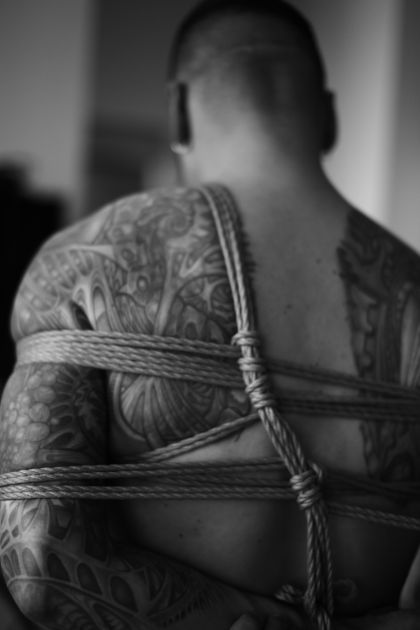
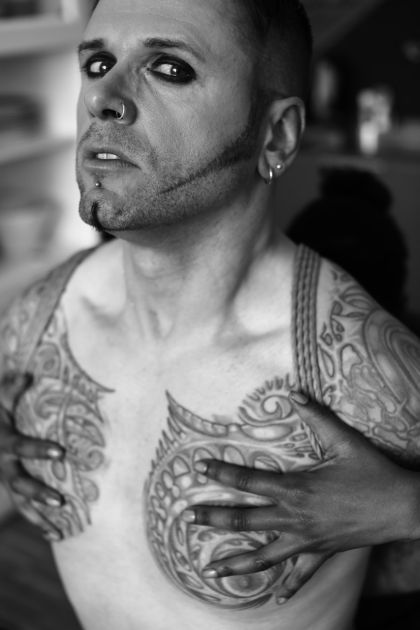
RoD: What is your taboo in terms of tattoos? What kind of tattoo would you never get done and don’t like to see on other people?
Dero: Of course, the tattoos, which contradict my political, moral and ethical principles, which I naturally would not want on me and may not like on others to see. But it is their right to get done what they want. If they think they must have it, they should do it. I do not like to look at fascist emblems, for example, I do not need them, and I do not like them. This rather makes me feel sick. But if someone means for themselves to enhance his body with it, then that is their good right. I am rather disgusted by it.
RoD: Some people say that the drive to acquire body art is addictive while others say it fails to meet the true definition of an addiction, simply calling it a passion. Is it really impossible to stop?
Dero: Well, so I think it's addictive. Many hormones are released into the brain, also happiness hormones. This is like extreme athletes who run through the area for three or four hours and then eventually realize that it makes them somehow happy. These brain-emptied hormones and messengers that cause these feelings of happiness in the body are similar by getting tattooed. Therefore, it has the similar addictive qualities, like many other things that affect the happiness and reward centre in the brain and can addict.
RoD: Currently tattoos are a new trend; many people do not care about the meaning, they just want to have something coloured on the skin, to be in trend. Those people often just go into a tattoo salon and ask which drafts they have. Tattoo artists are not artists any more, they produce consumer goods. Not all of them, of course. How do you feel about this situation?
Dero: Well, I think there is no tattoo artists in the world who is annoyed by the amount of his accountancy, he will be rather happy. On the other hand, you are right, the taste changes and some people regret their youthful sins. But then there are the laser studios. And so, one hand washes the other.
RoD: Yes, but I do not understand people who are running behind fashion. But that is their problem, not mine.
Dero: Exactly, I have learned one thing in my life that you cannot understand and you don't need to understand all people.
RoD: Yes, you are right. I would like to talk about the social aspect of tattoos, too. Previously, many people believed that if you have a tattoo, you will be never being successful and will not find a "good" job. Have this state of mind and people's perceptions changed or are these prejudices still alive?
Dero: I think it has changed a bit. Tattoos have become socially acceptable. This is proved by football stars all over the world who also have large and striking tattoos, but also the musicians have made tattoos socially acceptable. However, in many professions it is still disadvantageous if you have tattoos in clearly visible places: face, neck, hands. As long as you can conceal that with the work clothes, you can theoretically also be tattooed banker, you can pull a shirt and suit over it and so also be manager or something else. But as soon as the face and the hands are tattooed, it becomes difficult to get into some professions, I think. In other professions, it may not be so important. But I think in many professions, tattoos are still rather disadvantageous. At the end, everyone must decide for themselves.
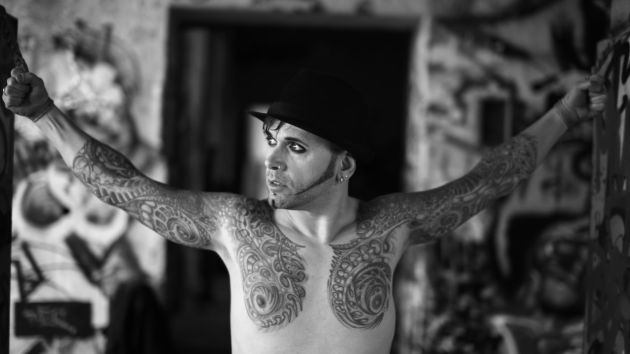
RoD: Yes, although tattoos tell nothing about you as a person and about the quality of your work.
Dero: Yes, at least not, you are right, but these are the prejudices that are anchored in people, you will not be able to throw them away so quickly. In New Zealand, in the native population, it is normal that the faces are tattooed, but in Germany or Europe this is not so anchored in the culture. For this reason, tattoos unfortunately still have the taste of crime, underworld and red light. Traditionally, tattooing has come to Europe by the sailors. They were in different countries and have seen that people are tattooed and then they have been partially tattooed there and so they have brought tattoos to us. There were also the first tattoo artists in the port cities in England and Spain. This has spread. Sailors had probably not had the best reputation. As a rule, they have not belonged to the upper class, and so it has become so solid that tattooed people are more likely to be people who, in doubt, may act differently than others. But tattoos have absolutely become significantly socially acceptable.
RoD: This was one of the reasons why I started this project, because I see tattoos as art. I try somehow to bring this idea closer to the people. That tattoos are art and should not be condemned.
Dero: Right, I feel the same way. But you know how it is - art cannot be argued. Some people have this attitude; some have the other. This is the same in other art directions. Somebody, like Joseph Beuys, smears a piece of butter in the corner and says that is art and everything man does is ultimately art and another says that is not art and only what Michelangelo and da Vinci have done is art, nothing else is art. I am very tolerant and very open. I say that what any human being feels as art is art, even if it is only one human being. The mass must not necessarily be right. Just because more people feel something like art, it does not have to be better art. As soon as a person says something is art then it is also art, as I said.
RoD: And we are already reaching the last question. Which advice would you give to people who are going to get their first tattoo? How to choose a tattoo artist? Colour or black and white? Any practical advice?
Dero: I believe hygiene is very, very important. You need to see hygiene certificates and the chemistry expertise of the colours. There are still black sheep who make tattoo with car brackets and that is extremely unhealthy. Of course, you should then also consider the aesthetic feeling of the tattoo artist. If you come to the tattoo artist and want to have this one thing on this place and he says ok, I do, although he thinks that the proportion does not fit to the place at all, one must increase, reduce or it should be positioned in another place so that it looks good, so if the tattoo artist does not advise you and only does what you want, then this is not a good tattoo artist. A tattoo artist always has an aesthetic mission, in doubt, to say, think again, your idea is not yet the best… that there is even a better one. He must advise you or you come back with an idea, with which you both say now makes sense, now it looks great. After all, the tattoo will accompany you all your life.
That's why you must think about it long enough. I would not advise young people aged 18 or over to get tattooed in places they cannot hide through clothing. Something like that should grow. That is, you should be tattooed in places that you can still conceal and develop the feeling what it means to be tattooed. Maybe to say later, but I still want to be tattooed in places that cannot be concealed. It also marks a good tattoo artist when an 18-year-old comes to him to tattoo his neck to the chin, and he says, no I will not do this, think about it for some time, you're 18 years, you do not even know what you're getting into. A tattoo artist always has a responsibility and a good tattoo artist takes that responsibility. You can recognize serious tattoo artists and distinguish them from black sheep.
Project by Daria Tessa and Daniela Vorndran, interview by Daria Tessa
Pictures by Ronny Zeisberg (black and white) and Anni Landi (colour)




















